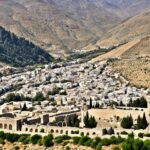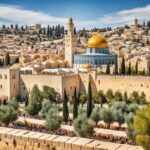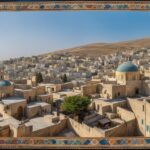Beersheba, located in the Negev desert of southern Israel, holds great historical and biblical significance. The biblical site of Beersheba, known as Tel Be’er Sheva, dates back to the time of Abraham and Isaac. It played a central role in key biblical events, including covenants of peace, encounters with divine beings, and the establishment of significant relationships. The name Beersheba itself translates to “Well of the Oath” or “Well of the Seven,” symbolizing the sacred nature of this location within biblical narratives.
Key Takeaways:
- Beersheba is a historically and biblically significant site in southern Israel.
- The name Beersheba translates to “Well of the Oath” or “Well of the Seven.”
- It played a central role in key biblical events and covenants of peace.
- Tel Be’er Sheva is the archaeological site associated with Beersheba.
- Exploring Beersheba offers insights into biblical narratives and the cultural practices of the time.
Historical Significance of Beersheba
Beersheba boasts a profound historical significance, with archaeological discoveries shedding light on its importance dating back to the Copper Age, over 5000 years ago. During biblical times, Beersheba emerged as a prominent city and was witness to pivotal events involving renowned biblical figures such as Abraham and Isaac. Particularly, the well of Beersheba holds a prominent place in various biblical narratives, symbolizing themes of peace, reconciliation, and divine intervention.
Geographical Location of Beersheba in Biblical Times
During biblical times, Beersheba held a significant position in ancient Israel, situated in the region known as the Negev. This city was located in the southern part of Israel, close to the border between Israel and Egypt.
The strategic location of Beersheba made it a vital hub for trade and commerce, attracting merchants and travelers from different regions. Its position as a resting stop along desert routes contributed to its cultural and historical importance.
Beersheba’s proximity to other prominent biblical cities, such as Hebron and Jerusalem, further enhanced its significance. These connections fostered trade networks, cultural exchange, and political alliances, consolidating Beersheba’s role in shaping the ancient Israelite society.
In the map below, you can see the location of Beersheba in ancient Israel:
| Neighboring Areas | Distance from Beersheba |
|---|---|
| Hebron | Approximately 28 miles (45 kilometers) north |
| Jerusalem | Approximately 59 miles (95 kilometers) northeast |
| Arad | Approximately 31 miles (50 kilometers) southeast |
| Gaza | Approximately 39 miles (63 kilometers) southwest |
As seen in the map and table above, Beersheba’s location in biblical times placed it in close proximity to other significant cities, fostering cultural, political, and economic exchanges throughout the region.
Archaeological Discoveries in Beersheba
Excavations at Tel Be’er Sheva, the biblical site of Beersheba, have yielded remarkable archaeological findings. These discoveries, including ancient wells, dwellings, pottery, and other artifacts, offer valuable insights into the daily lives and cultural practices of the people who inhabited Beersheba during biblical times.
The excavations at Tel Be’er Sheva have provided archaeologists with a window into the past, allowing them to piece together the rich history of Beersheba. The artifacts uncovered in the area not only corroborate the biblical narratives but also shed light on the way of life and material culture of the ancient inhabitants.
Among the notable finds are intricately designed pottery vessels, indicating the artistic skill and craftsmanship of the people of Beersheba. These artifacts offer a glimpse into their everyday lives and possibly reflect their beliefs, cultural practices, and trading networks.
“The excavations at Tel Be’er Sheva allow us to see the physical traces of the ancient city and its inhabitants, bringing the stories of Beersheba to life,” says Dr. Rachel Avner, an archaeologist specializing in ancient Israel. “Each artifact tells a unique story, contributing to a more comprehensive understanding of Beersheba’s past.”
One of the most significant discoveries is the well system in Beersheba, which played a crucial role in supporting the city’s inhabitants and their livestock. The well system consisted of several wells that drew water from the expansive underground aquifer, sustaining the community in the arid desert environment.
| Archaeological Findings in Beersheba | Description |
|---|---|
| Ancient Wells | The excavations have uncovered numerous wells, showcasing the vital role they played in providing water to the ancient city. |
| Ceramic Artifacts | The pottery artifacts found at the site reveal the artistic skills and cultural practices of the ancient inhabitants. |
| Dwelling Remains | The remains of ancient dwellings provide insights into the architectural styles and daily lives of the people who lived in Beersheba. |
| Cultic Objects | Various objects associated with religious rituals have been discovered, shedding light on the spiritual practices of the ancient inhabitants. |
These archaeological findings and the ongoing excavations at Beersheba continue to deepen our understanding of the historical and cultural significance of this ancient city. They reinforce the connection between the biblical narratives and the material remains, shaping our understanding of Beersheba’s role in the ancient world.
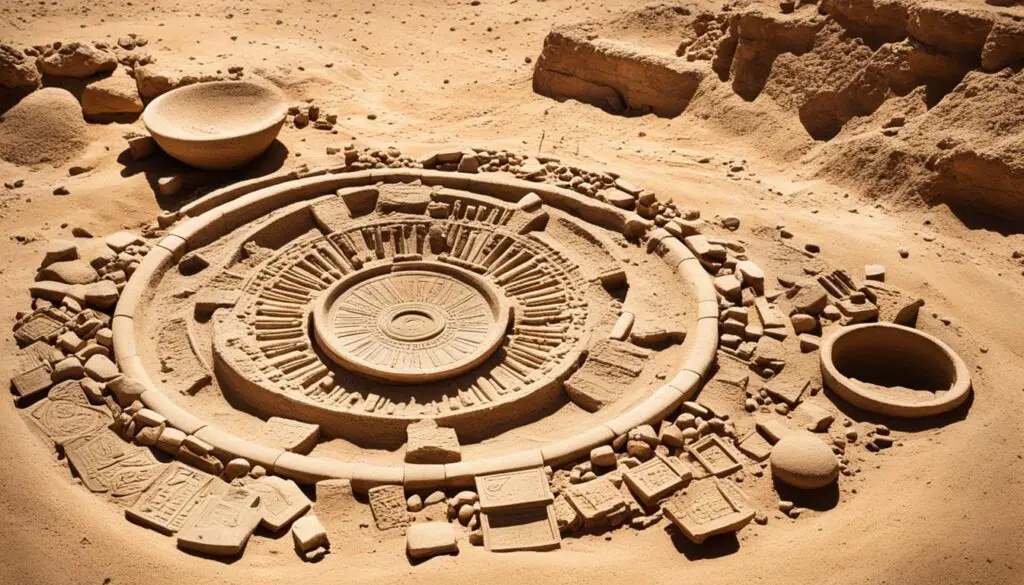
Theological Themes in Beersheba
Beersheba, a significant location in the Bible, holds deep theological significance and embodies various symbolic meanings. One of the prominent theological themes associated with Beersheba is peace and reconciliation. The well of Beersheba is often depicted as a place where conflicts are resolved and peaceful covenants are established. This emphasizes the importance of trust, forgiveness, and harmony in maintaining healthy relationships.
Another theological theme revolves around divine intervention. Beersheba represents a place where God intervenes and provides solutions to challenges. The miraculous interactions and encounters that took place in Beersheba portray the divine presence and intervention in human affairs, highlighting the faith and reliance on God’s guidance.
The desert location of Beersheba also carries biblical symbolism. The desert is often portrayed as a barren and desolate place, representing spiritual thirst and longing. Beersheba’s position in the desert serves as a metaphor for the human soul’s yearning for God’s living water and the fulfillment of spiritual needs.
“In Beersheba, we find not only ancient wells that quenched physical thirst but also a deeper thirst for spiritual fulfillment.”
The theological themes and symbolic representations of Beersheba add depth and meaning to the biblical narratives in which it is mentioned. They provide insights into the foundational values of trust, peace, and divine intervention, and highlight the spiritual yearning for fulfillment and connection with the divine.
| Theological Themes in Beersheba | Symbolism |
|---|---|
| Peace and Reconciliation | Well of Beersheba as a place for establishing peaceful covenants |
| Divine Intervention | Encounters in Beersheba showcasing divine presence and guidance |
| Spiritual Thirst | Metaphorical representation of the need for God’s living water |
Key Biblical Events in Beersheba
Beersheba holds a significant place in several key biblical stories, showcasing its importance in the faith journeys of biblical figures. The city’s well, specifically, serves as a backdrop for pivotal events and establishes connections between different characters.
Abraham and Abimelech, in an act of reconciliation and communication, establish a covenant of peace at the well of Beersheba. This event demonstrates the power of understanding, trust, and the resolution of conflicts.
“So Abraham made a covenant with Abimelech at Beersheba.” – Genesis 21:32
Isaac, the son of Abraham, also has memorable encounters at Beersheba. In one instance, he has a dream of a stairway to heaven, symbolizing divine connection and guidance. Additionally, Isaac makes agreements with Abimelech, further solidifying Beersheba’s significance in the establishment of relationships and alliances.
| Key Biblical Events | Biblical References |
|---|---|
| Abraham and Abimelech establish a covenant of peace | Genesis 21:32 |
| Isaac’s dream of the stairway to heaven | Genesis 28:10-19 |
| Isaac’s agreements with Abimelech | Genesis 26:26-33 |
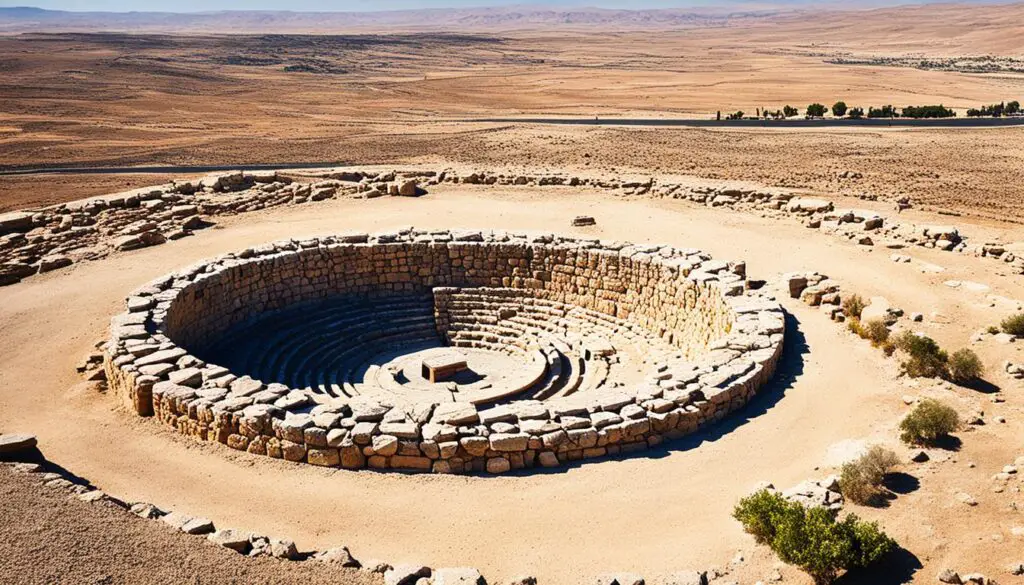
These key events in Beersheba highlight the city’s role as a place where important relationships are formed, divine encounters occur, and peace is established. The biblical narratives surrounding Beersheba continue to inspire believers to seek reconciliation, establish connections, and experience spiritual growth.
Cultural and Religious Practices in Beersheba
In ancient times, Beersheba was a hub of cultural and religious practices that shaped the identity and customs of its people. These practices encompassed a range of activities, from animal husbandry and agriculture to trade and commerce.
One of the prominent cultural practices in Beersheba was animal husbandry. The inhabitants of Beersheba raised livestock, including sheep, goats, and camels. The dry and arid desert landscape of the region provided suitable conditions for grazing animals, making herding an essential part of their livelihood. This practice not only ensured a steady supply of food and materials but also fostered a deep connection between the people and the natural environment.
Agriculture was another significant cultural practice in Beersheba. Despite the harsh desert conditions, the people of Beersheba cultivated crops such as wheat, barley, and olives. They utilized innovative techniques like terracing and cisterns to optimize water usage and adapt to the arid climate. These agricultural practices showcased their resourcefulness and resilience in sustaining their communities.
Beersheba’s position at the crossroads of trade routes made it a bustling center for commerce and exchange. Merchants from neighboring regions converged in Beersheba, bringing with them goods such as spices, textiles, and precious metals. This vibrant trade network facilitated cultural exchange and introduced new ideas, traditions, and goods to the people of Beersheba.
Religious practices held a significant place in the lives of the inhabitants of Beersheba. The well of Beersheba, considered sacred, served as the site for various religious rituals and sacrifices. These practices were symbolic expressions of the people’s devotion to the divine and their reliance on higher powers for sustenance and protection.
Religious rituals and sacrifices were central to the cultural fabric of Beersheba, reinforcing the people’s deep-seated faith and belief in the divine.
These cultural and religious practices in Beersheba reflected the importance of community, nature, and spirituality in the lives of its inhabitants. They established a strong sense of identity and contributed to the rich tapestry of traditions and customs that defined Beersheba’s ancient society.

Examples of Cultural and Religious Practices in Beersheba
To illustrate the diverse cultural and religious practices in Beersheba, here are a few examples:
| Cultural Practices | Religious Practices |
|---|---|
| Animal husbandry, including raising sheep, goats, and camels | Performing rituals and sacrifices at the well of Beersheba to seek divine favor and blessings |
| Agricultural cultivation of crops like wheat, barley, and olives | Offering thanksgiving sacrifices for successful harvests and seeking divine guidance for farming endeavors |
| Engaging in trade and commerce with merchants from neighboring regions | Participating in religious festivities and pilgrimages at Beersheba to honor the divine |
These examples demonstrate the interconnectedness of cultural and religious practices in Beersheba, highlighting the holistic nature of life in ancient times.
Prophetic and Eschatological Significance of Beersheba
Beersheba holds a profound place in biblical prophecy and eschatology. The well of Beersheba serves as a powerful symbol of hope and redemption, pointing towards a future where God’s promises are fulfilled. It represents a deep longing for spiritual awakening and the restoration of peace and harmony.
In certain biblical texts, Beersheba is mentioned as a marker or boundary, signifying the larger context of eschatological events and the divine plans for the future. It serves as a reminder that God’s purposes extend far beyond the present moment, with Beersheba standing as a testament to the unfolding of God’s redemptive plan.
“The prophecies surrounding Beersheba remind us of the ultimate victory over darkness and the assurance that God’s promises will come to pass. Beersheba represents a glimpse into the eschatological beauty and glory that await us.”
The eschatological references add a sense of anticipation and destiny to the narrative surrounding Beersheba. They encourage believers to remain steadfast in their faith, knowing that God is working all things towards His ultimate purposes.
Through the prophecies and eschatological significance of Beersheba, we are reminded of the great hope and expectation that lies ahead. It serves as a beacon of faith, pointing us towards the fulfillment of God’s divine plan for humanity.
The Prophetic and Eschatological Significance of Beersheba
| Prophecy | Meaning |
|---|---|
| The well of Beersheba | A symbol of hope and redemption |
| Beersheba as a marker or boundary | Signifying the larger context of eschatological events and divine plans for the future |
Modern Significance of Beersheba
Beersheba, located in southern Israel, continues to be a vibrant city today, combining a deep historical and cultural heritage with contemporary progress. The city has transformed into a hub of innovation and technology, exemplified by its renowned institution, Ben-Gurion University of the Negev. Beersheba serves as a center for Israel’s high-tech and emerging technology industry, attracting entrepreneurs, researchers, and students from around the world.
The modern-day city of Beersheba beautifully blends ancient traditions with a thriving cosmopolitan atmosphere. Tourists and scholars are drawn to Beersheba to explore its rich biblical significance and archaeological findings. By walking through the ancient sites and immersing themselves in the city’s cultural offerings, visitors gain a deeper understanding of the historical context and biblical stories associated with Beersheba.
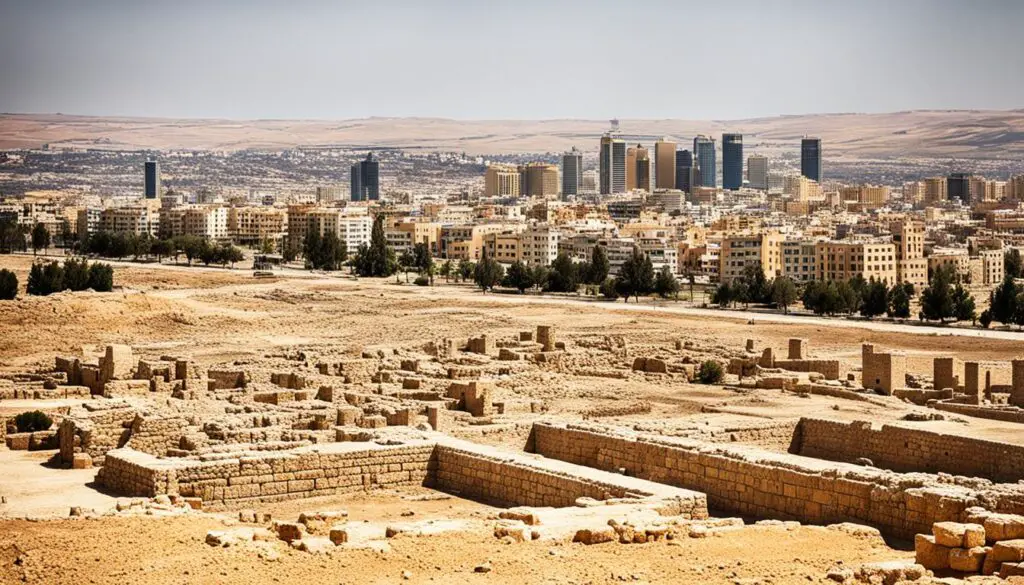
Beersheba’s contemporary landscape reflects its enduring significance as both a historical destination and a city in perpetual growth. With its captivating blend of the past and the present, Beersheba stands as a testament to the resilience and ongoing relevance of biblical narratives in our modern world.
Key Highlights
- A vibrant city in southern Israel
- Home to Ben-Gurion University of the Negev
- A center for Israel’s high-tech and developing technology industry
- Attracts tourists and scholars exploring biblical significance and archaeological findings
- Blends ancient traditions with contemporary progress
| City Features | Modern Significance |
|---|---|
| Bustling cosmopolitan atmosphere | Reflects the city’s growth and integration into the global community |
| Ben-Gurion University of the Negev | A hub for academic excellence, research, and innovation |
| Innovation and technology industry | Drives economic development and fosters technological advancements |
| Archaeological sites and biblical significance | Preserves the city’s rich history and attracts cultural exploration |
“Beersheba beautifully combines ancient traditions with a thriving cosmopolitan atmosphere, capturing the essence of its contemporary significance.”
Beersheba’s modern-day allure lies in its ability to honor the past while embracing the future. The city’s dynamic blend of history, innovation, and cultural preservation ensure its place as a significant destination for both locals and international visitors.
The Enduring Legacy of Beersheba
Beersheba, with its historical, cultural, and religious impact, has left an indelible mark on the course of history. As depicted in the Bible and its association with significant biblical figures and events, Beersheba’s enduring prominence is evident. Its theological themes and symbolic meanings continue to resonate with believers, providing valuable lessons in trust, reconciliation, and faith.
The archaeological discoveries and ongoing research conducted in Beersheba contribute to our understanding of the past, shedding light on the biblical narratives in meaningful ways. These findings provide tangible evidence that validates the stories told in the Bible, enhancing our comprehension of the historical and cultural context surrounding Beersheba.
Beersheba’s legacy serves as a poignant reminder of the rich and multifaceted tapestry of the biblical world. Its profound impact endures through the ages, influencing the faith and spirituality of countless individuals.
The Lasting Influence of Beersheba
- Beersheba’s legacy continues to inspire people to seek deeper spiritual truths and connections with the divine.
- The city’s mention in the Bible ensures its lasting influence on religious and cultural practices.
- The theological themes and symbolic meanings associated with Beersheba shape the teachings and beliefs of believers across generations.
- Archaeological discoveries in Beersheba provide tangible evidence that supports and enhances our understanding of the biblical narratives.
- The enduring historical and cultural significance of Beersheba makes it a significant destination for both scholars and tourists.
“Beersheba’s legacy serves as a testament to the enduring power of faith, peace, and reconciliation.”
Beersheba’s heritage touches the hearts and minds of those who explore its history, offering profound insights into the values and principles that underpin our shared humanity.
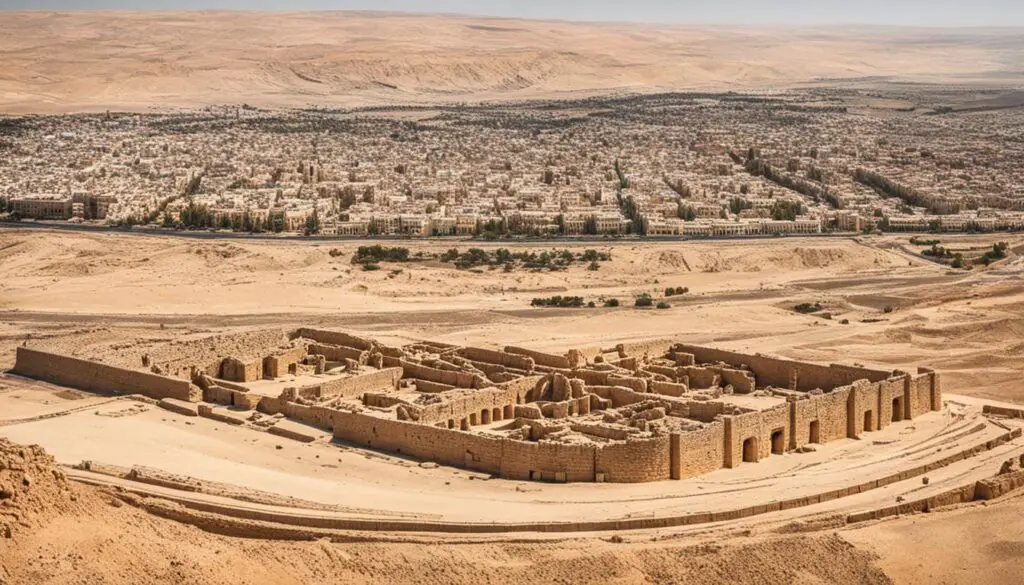
Conclusion
Beersheba’s role in biblical events, its historical and geographical significance, and its profound theological themes make it a captivating subject for study and contemplation. The city’s impact on the biblical narratives and the lives of believers throughout history cannot be overstated. Beersheba serves as a powerful reminder of the transformative power of faith, the importance of peace and reconciliation, and the enduring legacy of spiritual connections with the divine.
From its sacred well, symbolizing peace and divine intervention, to its location in the desert, representing spiritual thirst and the need for God’s living water, Beersheba holds a deep symbolic meaning within the biblical narratives. The archaeological discoveries unearthed at Tel Be’er Sheva further corroborate the historical veracity of the biblical accounts and provide valuable insights into the daily lives and cultural practices of the people who inhabited this ancient city.
Today, Beersheba continues to thrive as a modern city in southern Israel, with a blend of ancient traditions and contemporary progress. It attracts tourists and scholars alike, who are drawn to explore its rich biblical heritage and archaeological treasures. Beersheba’s enduring legacy as a center of faith, peace, and reconciliation continues to inspire individuals to seek deeper spiritual truths and forge meaningful connections with the divine.




